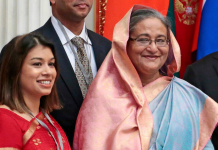Brussels, Belgium, Nov 4 (AFP/APP): Would-be members of the next European Commission face a public grilling by lawmakers starting Monday, setting up a decisive vote on Ursula von der Leyen’s new top team at the end of this month.
The showdown is a rare opportunity for the European Union parliament to flex its muscles against the bloc’s powerful executive — and the outside chance a candidate may stumble keeps Brussels on its toes.
Each of the EU’s 27 nations gets one seat on the commission, which drafts and enforces European law on key issues such as trade, competition and technology.
Hundreds of lawmakers will train their crosshairs on commissioner-designates for three hours each from Monday to Thursday — before a grand finale on November 12 when von der Leyen’s six vice-president candidates will be heard.
These include Spain’s Teresa Ribera — a socialist who has the vast environmental portfolio and will have to reassure sceptical right-wingers of her commitment to pair climate goals with growth.
At the other end of the spectrum is Raffaele Fitto, of Giorgia Meloni’s far-right Brothers of Italy party. He was handed a VP role in a nod to the growing influence of the far-right after their gains in EU elections.
Fitto’s top role has infuriated lawmakers on the left and centre — who will be tempted to give him a public dressing down.
More than half the nominees hail from von der Leyen’s conservative European People’s Party, the biggest force in parliament.
Reelected to a second term following June’s elections, the 66-year-old German allocated portfolios in September based on experience as well as political and national clout.
“My commissioner is laser-focused. It’s like preparing for an exam,” said one associate on condition of anonymity, describing mock hearings where experts try to push the candidate into a corner.
The outgoing environment, oceans and fisheries commissioner Virginijus Sinkevicius — elected as a Green EU lawmaker for Lithuania in June — recalls his own hearing five years ago as a “mix of nerves and adrenaline.”
“The hardest part was managing the pressure while staying true to what I believed in,” he told AFP.
This time Sinkevicius will be doing the grilling.
“A lot comes down to how you step into that room,” he said, “whether you can communicate your vision.”
Among four commissioners appearing Monday is Glenn Micallef — who hails from the EU’s smallest member state, Malta, and at 35 is also the junior member of the team. His portfolio includes youth, culture, sport and “intergenerational fairness”.
His own youth and relative inexperience make Micallef one of the commissioners seen as most vulnerable.
Also at risk is Hungary’s Oliver Varhelyi, nationalist Prime Minister Viktor Orban’s man in Brussels these past five years who was caught on hot mic calling lawmakers “idiots” — winning him few friends in parliament.
But diplomats warn that knocking back Varhelyi may merely give Orban a window to delay the process.
Italy’s Fitto faces a tough time, but initial hostility from the left and centre seems to have tempered.
Writing to lawmakers ahead of his hearing, Fitto sought to assuage doubts about his European credentials.
“I have always been a firm supporter of the European project, as well as of the fundamental principles and values of the rule of law that underpin it,” he wrote.
At their core the commissioner hearings are about the balance of power — between the EU’s institutions, the political forces in parliament, and the member states.
The centrist Renew Europe wrote to von der Leyen ahead of time warning her that commissioners must show an understanding that “progress lies in the centre, not the extremes” — in an allusion to the growing clout of the far right.
But Renew also says it will examine each candidate on their merits, as do the Socialists and Democrats — the second largest group in parliament — who insist they have no “kill list”.
Ultimately, parliamentarians are mindful that going too heavy on commissioners from a rival party, might set off a chain reaction.
Last time, lawmakers knocked back France’s Sylvie Goulard at the hearing stage, while the representatives for Hungary and Romania were axed during vetting for conflicts of interest.
Parliament is provisionally scheduled to vote on confirming the commissioners on November 27 and they would start a five year term in early December.

















